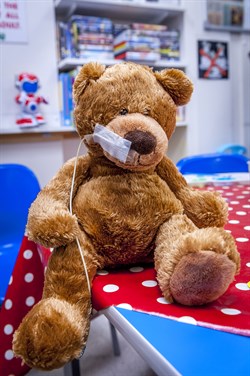Paediatric medical teams at the Bristol Royal Hospital for
Children (BRHC) celebrated a significant milestone on May
7th.
The major trauma centre accepts patients from across the South
West of England, from Cornwall to Gloucester, covering a paediatric
population of around 810,000. In its first year, the centre has
seen 202 paediatric major trauma patients.The day marked the first
anniversary of the hospital becoming the paediatric major trauma
centre for the South West of England, as well as the centralisation
of specialist paediatric services in Bristol.
Dr Giles Haythornthwaite, paediatric emergency medicine
consultant and clinical lead for the new children's major trauma
centre at the BRHC, said: "Becoming a paediatric major trauma
centre has added a lot of value for paediatric patients in the
region who are very seriously injured.
"In terms of numbers through the doors, we have been busier than
predicted, but the emergency department and the hospital as whole
has coped remarkably well. The centre has been peer-reviewed
nationally, and our outcome measures place BRHC very well compared
to other paediatric major trauma centres in the UK.
"However, we know there is still work to do, and we are far from
complacent."
An important component for the major trauma centre is the
helideck on the roof of the Bristol Royal Infirmary, which allows
seriously injured and ill patients to be transferred by air
ambulance. Giles said: "The helideck has worked very well,
everything has been very smooth. Dale Robson, the supervisor, and
his team deserve a lot of credit."
In the last year, many young patients have also benefitted from
having all the services they needed in one location, following the
centralisation of specialist paediatric services. As well as
major trauma and additional emergency activity, BRHC also welcomed
paediatric burns, neurosurgery, plastic and orthopaedic services
from Frenchay.
Consultant paediatric anaesthetist and paediatric burns
specialist Dr Amber Young, whose service transferred from Frenchay
last year, and who was instrumental in the project's planning,
said: "The service at Frenchay for these specialist services for
children was high quality. The services at the Bristol Royal
Hospital for Children are world class. Now that we have all
paediatric services on one site, the care pathways for children
with burns, neurosurgical problems or major trauma have improved,
importantly along with outcomes. Team working is fantastic and all
the staff have worked hugely hard to make this major change a
success, which it has been. This is something to be proud of."
The family of two-year old Noah Hardman, from Gloucestershire,
understand the value of having all children's services in one place
better than most. Noah, his two brothers Ethan and Finley, and
their father Alex were all brought to UH Bristol's emergency
departments following a serious car collision.

All three children suffered serious injuries, but most seriously
injured was Noah, who suffered a broken neck, broken ribs and a
fractured clavicle. His mother, Kirsti, said: "We'd never used the
hospital before, so it was all brand new to us. Only when we came
here did we realise how big it was, and the fact it was a major
trauma centre. They have been, from day one, amazing.
"It's definitely been important that all the medical
specialities all the boys needed were here on the same place. From
day one, after the prognosis we were given for Noah, to now is
phenomenal. Having the rehab centre separate was great as Noah
could relax more, sleep better, and get the rehabilitation he
needed, but still have all the necessary teams around if they were
needed. "When they were all brought in, Noah was in resus,
the two other boys were in children's ED and Alex was in the BRI's
ED. I couldn't be in three places at once, so two of the staff in
ED, a nurse called Lucy and a trainee doctor called Rachel, stayed
with them the whole time while the trauma co-ordinator, Trish, was
a go-between letting me know how Alex was. That meant I could stay
with Noah in resus. I don't think we could have done it if we
hadn't had all their support.
"The physiotherapists have been fantastic. The first day they
worked with him, he screamed, he didn't understand - he's only two.
Now, they come in and he tries to give them a hug and gets really
excited, and he knows that they're going to help him walk. They've
been so patient with him. Everyone has made an effort to get to
know him, and worked so hard to earn his trust, he loves them all.
It worked completely for Noah, it was everything he needed to aid
his recovery. We can't praise it enough."










